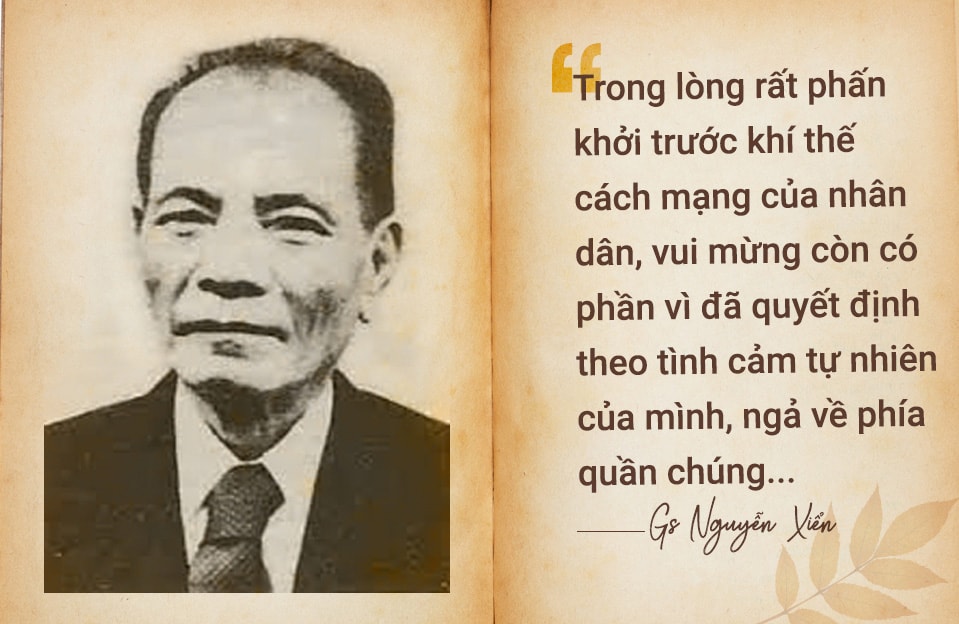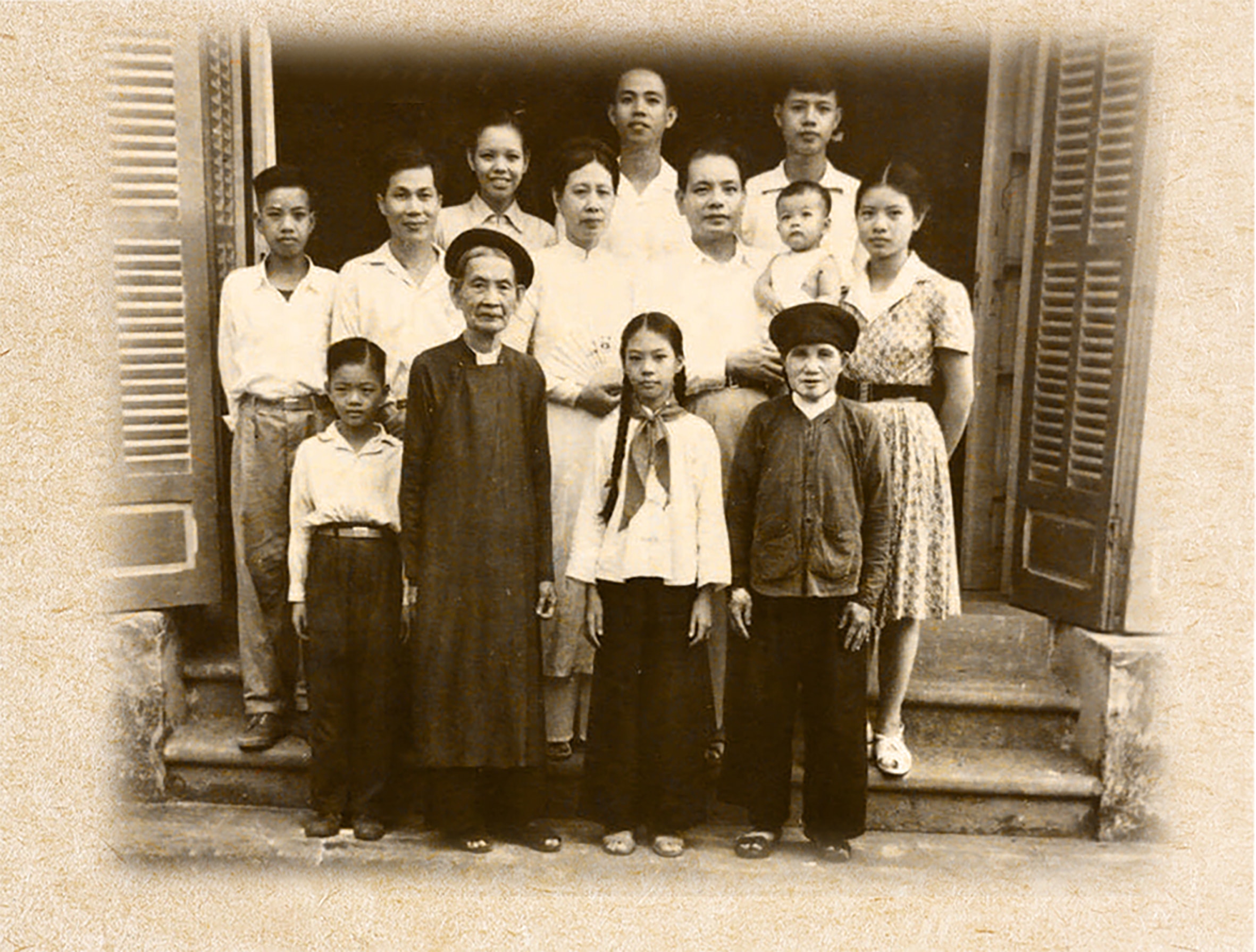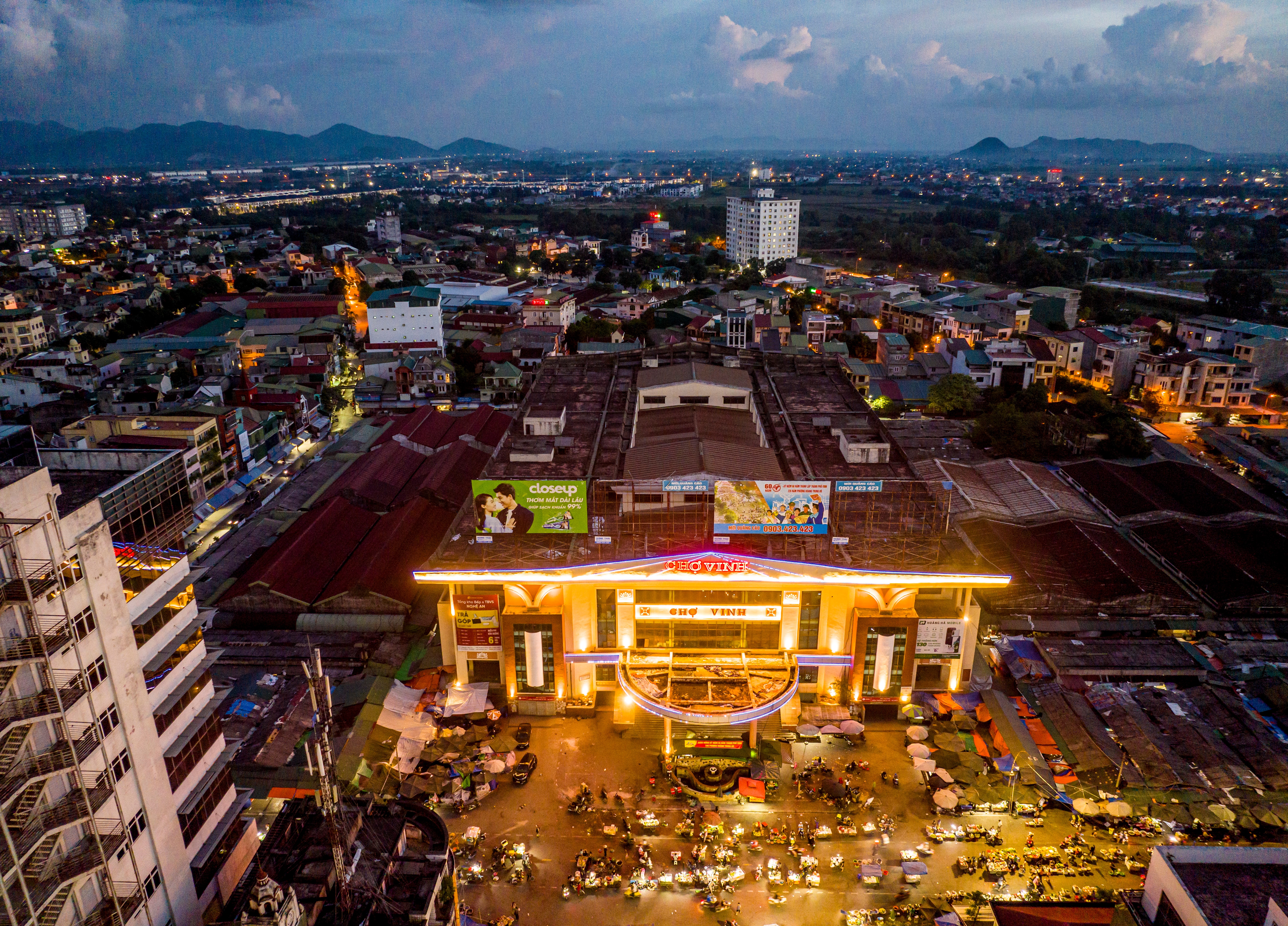Professor Nguyen Xien - an outstanding Vinh person
(Baonghean.vn) - Professor Nguyen Xien (1907 – 1997) was “a patriotic intellectual who loved democracy and progress” as he once confirmed. He came to the Revolution as a natural act of a patriot and because of his respect and trust in President Ho Chi Minh.
1. Professor Nguyen Xien was born on July 27, 1907 in Trung My village, Yen Truong commune (now Hong Son ward, Vinh city) in a family with a long tradition of Confucianism. His grandfather and father passed the bachelor's exam and then participated in the Can Vuong and Van Than movements.

As a child, Nguyen Xien studied Chinese characters in the village. At the age of 10, he studied at the French-Vietnamese Primary School. From 1921 to 1924, he studied at the Vinh National School, graduated, and then went to Hanoi to study at Ban Ho High School (Buoi School). In 1926, he was expelled from school and banned from taking the local baccalaureate exam because he participated in the mourning movement for Phan Chu Trinh. He determined to study on his own and passed the French Baccalaureate exam in 1928 at Albert Sarraut High School.
Thanks to his good grades and high scores, in 1928, Nguyen Xien, Nguyen Van Dinh, Hoang Xuan Han, Tran Van Ty, with the help of Nghe An Governor Pham Lieu and Judge Nguyen Khac Niem won the scholarship from the Association of Nhu Tay to study in Central Vietnam and France.
In France, he first studied at the Toulouse Institute of Practical Electromechanical Engineering, then switched to studying basic sciences, mainly Mathematics. After 4 years, he had a bachelor's degree in science, defended his master's thesis to prepare for the master's exam, and could have stayed to continue studying to defend his doctorate, but due to difficult family circumstances, he returned home in 1932. With "the tendency to be a liberal intellectual also made me choose the profession of teaching at private schools" (memoirs). He taught at Thang Long, Gia Long, and Hong Bang schools at the same time. From 1935, he taught at Buoi School.
In 1937, he was transferred to work as a meteorological engineer. He was the first Vietnamese to be recruited into the Indochina meteorological department. From 1938 to 1941, he worked at the Saigon Meteorological Station. In 1941, he was appointed as the head of the Indochina Observatory in Phu Lien (Kien An - Hai Phong). During this time, he participated in and served as the President of the National Language Propagation Association of Kien An province.
In 1942, he and Mr. Hoang Xuan Han, Dang Phuc Thong, Nguyen Duy Thanh, Nguyen Dinh Thu founded the newspaper.Sciencewhich he is the editor-in-chief. The purpose of the newspaper is to “widely disseminate scientific knowledge in Vietnamese, preparing for the country’s future education”.
After the Japanese coup against the French, the political situation was complicated and tense. He only steadfastly pursued science, did not join any political party or side with any faction, and did not participate in the Tran Trong Kim Government. On August 17, 1945, he participated in a demonstration in support of the Viet Minh; on August 19, he was the one who advised Mr. Nguyen Xuan Chu - Imperial Commissioner of the North, to order soldiers to lay down their weapons and surrender. Then, on August 22, 1945, he, Nguyen Van Huyen, Nguy Nhu Kontum and Ho Huu Tuong together sent a telegram to Hue asking King Bao Dai to abdicate and hand over the formation of the Government to the Viet Minh.
When the Provisional Revolutionary Government was established, he refused the invitation to hold the position of Minister of Transport and Public Works and recommended other intellectuals such as Dang Phuc Thong and Tran Dang Khoa. Later, out of respect for President Ho Chi Minh, he accepted the position of Chairman of the People's Committee of the North (later changed to the Administrative Committee) and Director of the Vietnam Meteorological Agency. Upon receiving the assignment, he and the People's Committee of the North immediately began taking over the old government, establishing administrative committees at all levels from province to commune, and urgently solving urgent problems. He successfully directed the repair of dikes broken by the great flood of August 1945 in 13 provinces of the North.
When the resistance war against France broke out, he went to the Viet Bac resistance base. He volunteered to transfer to the Ministry of Education to contribute to the construction of Vietnam's higher education sector. In 1947, he opened a correspondence course in advanced mathematics. Later, he was a Professor in the Board of Directors of the School of Advanced Basic Sciences and Pedagogy at the Central Campus in Viet Bac, then had to evacuate to Nanning (China) for a while. In Viet Bac, he compiled two textbooks:General MathematicsandPure mechanicsThese two books were later taught in Basic Science and Advanced Pedagogy.
After the end of the resistance war against the French, Nguyen Xien returned to Hanoi, urgently restored, built and developed the hydrometeorology industry in the North and the whole country after the victorious resistance war against the US. He is considered the founder of the hydrometeorology industry in Vietnam. He has many scientific works on meteorology, and is the author of many valuable hydrometeorological scientific works such asClimate characteristics of Northern Vietnam,Climate Atlas of Northern Vietnam…
He was the one who established cooperation in meteorology with other countries; he proposed and was accepted to organize the International Geophysics Year in Vietnam in 1957, of which he was the Chairman of the Vietnam Committee. Professor Nguyen Xien also had great contributions in building the Vietnamese calendar. He was the first Vice Chairman of the State Committee for Science and Technology, the first Chairman of the Vietnam Association for the Dissemination of Science and Technology. Regarding the dissemination of science, continuing the spirit of the Science newspaper, he advocated and was the first Chairman of the newspaper.Science and life(1956).
As a politician, he was a founder, Deputy Secretary General of the Socialist Party (1946), Secretary General from 1956 until the party ceased to operate (1988). He was a National Assembly Deputy from the 1st to the 8th terms, Vice President of the National Assembly from the 2nd to the 7th terms; Minister of Relief (1957).
Trusting and respecting President Ho Chi Minh, teacher and scientist Nguyen Xien devoted his whole life to the Revolution. Although there were times when he and intellectuals of the same generation could not avoid encountering narrow-minded and superficial prejudices, he remained faithful to the ideals of patriotism, love for the people, and respect for the people for progress.

It was not by chance that in 1957, when the National Assembly voted for the Government's confidence after mistakes in land reform, he was trusted to chair the meeting. Under his leadership, the Government continued to operate. He overcame barriers and complexes to look at the big picture, at the interests of the People and the Country to act. It was not that he did not criticize and give advice on mistakes and shortcomings, but he always acted wisely with the character and qualities of a great intellectual.
As the leader of the Socialist Party, Nguyen Xien always tried to unite intellectuals, mobilizing intellectuals to participate in the protection and construction of the country under the leadership of the Communist Party. At the same time, he also soon spoke up to propose to the Party and the State policies towards intellectuals. Since 1956, he had a series of articles "Specific policies towards intellectuals", "The issue of treatment towards intellectuals", "The issue of spiritual treatment towards intellectuals" in the To Quoc newspaper, issues 44, 45 and 46.
He wrote: “To mobilize and fully develop the intellectual force, we must arrange and use our brothers and sisters appropriately. And to arrange and use them appropriately, we must have a correct conception of the role and function of intellectuals, and must destroy the narrow-minded subjectivism and fundamentalism among some officials in charge… If we look down on them, do not trust them, and do not understand their strengths, how can we take advantage of their abilities?”
2.Reading his memoirs, written in 1995, two years before his death, we can clearly see that he had a deep and affectionate love for his homeland, his family, and his friends. “I am very proud of my homeland, full of quintessence and tradition, and deeply indebted to Nghe An, which has indirectly or directly given me certain profound influences and character.”
Having been away from home for nearly 70 years, he still remembers his hometown, his village and his city of Vinh clearly. “In my eyes when I was young, Vinh was still half urban, half rural, with some French offices and military camps, while still retaining some feudal relics. There were many small bamboo-roofed houses next to the streets where small shops and stores sprang up. The majority of the population were laborers and Chinese people who did business, and there were also some Northerners who came to work as civil servants, clerks, station masters or did handicrafts, watch repair, tailoring…..”.
“My village has a very beautiful name, Thanh Thuy, perhaps because the canal flows through it and continues with the Nha Le canal to Thanh Hoa. I often remember my hometown through some historical and cultural relics. To the south, near my house, there is Tam Toa temple built on the highest hill in the city. This temple worships a Tran Dynasty general who was wounded in battle and fell off his horse…”
Those who are interested in learning about Vinh, if they read his memoirs, will surely understand a lot more. “My village has Vinh market. It used to be a private market of Yen Truong commune… The market is located along Cua Tien river, bustling with boats. The market runs from the corner of Hang Trong communal house up to Ong’s house. From the bustling Khanh street, there is a road leading straight to the main gate of the market. Looking into the market is a row of shops divided into sections selling all kinds of things….”.
In his memoirs, Vinh and Yen Truong, his garden, his family and neighbors, the customs of Vinh are built up in such detail, so beautifully. The details, the stories that only those who were involved and truly loved can remember and write when they are 90 years old. “In my childhood, I lost myself in the middle of the market many times, dreaming of enjoying the delicious and strange things from the forest and the sea. On the day of the Tet market, my father took me to the market to buy some spices, agarwood, beeswax and brought them back, and taught me how to make incense sticks and hong lap trees to burn during Tet…”.

Love for his homeland is a driving force for him on the path of studying and striving to become a true intellectual. “Far from home, I still remember the merits of my ancestors, my neighbors, and my close relatives. The day I went to Hue to take the Primary School Graduation Exam, many families with little or much money donated money to help me with my exam expenses. When the whole village expressed their joy and expectation of my academic achievements, I felt encouraged to do something useful for the country... still keeping in mind the efforts to preserve the positive traditional values of Nghe Confucian scholars, of the nation's scholars”.
His homeland and ancestors were always his worries. In his last years, his health was deteriorating, but he still used a cane to return to his hometown to urge his children and grandchildren to rebuild the church before he passed away. Not long before his death, he returned to the church, prostrated himself before his ancestors and cried. Tears were only for the homeland and ancestors of a brave intellectual.
He was “a patriotic intellectual, a lover of democracy and progress”, a modern scholar who devoted his whole life to Science and the Fatherland. Vinh people and Nghe An people are proud of him – an outstanding Vinh person.

